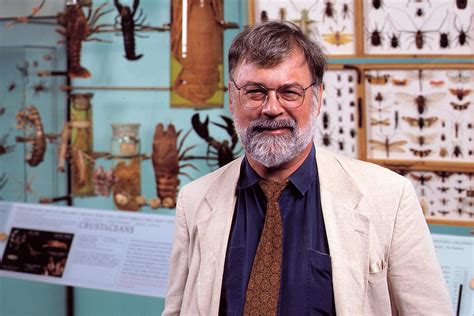A Quote by Ernst Mayr
Paleontologists had long been aware of a seeming contradiction between Darwin's postulate of gradualism, confirmed by the work of population genetics, and the actual findings of paleontology. Following phyletic lines through time seemed to reveal only minimal gradual changes but no clear evidence for any change of a species into a different genus or for the gradual origin of an evolutionary novelty. Anything truly novel always seemed to appear quite abruptly in the fossil record.
Quote Topics
Actual
Always
Any
Anything
Appear
Aware
Been
Between
Change
Changes
Clear
Confirmed
Contradiction
Darwin
Different
Evidence
Evolutionary
Findings
Following
Fossil
Genetics
Gradual
Gradual Change
Gradualism
Had
Lines
Long
Minimal
Novel
Novelty
Only
Origin
Paleontology
Population
Quite
Record
Reveal
Seemed
Seeming
Species
Through
Time
Truly
Work
Related Quotes
Paleontologists ever since Darwin have been searching (largely in vain) for the sequences of insensibly graded series of fossils that would stand as examples of the sort of wholesale transformation of species that Darwin envisioned as the natural product of the evolutionary process. Few saw any reason to demur - though it is a startling fact that ...most species remain recognizably themselves, virtually unchanged throughout their occurrence in geological sediments of various ages.
The observation that species are amazingly conservative and static entities throughout long periods of time has all the qualities of the emperor's new clothes: everyone knew it but preferred to ignore it. Paleontologists, faced with a recalcitrant record obstinately refusing to yield Darwin's predicted pattern, simply looked the other way.
It has always seemed to me that the only painless death must be that which takes the intelligence by violent surprise and from the rear so to speak since if death be anything at all beyond a brief and peculiar emotional state of the bereaved it must be a brief and likewise peculiar state of the subject as well and if aught can be more painful to any intelligence above that of a child or an idiot than a slow and gradual confronting with that which over a long period of bewilderment and dread it has been taught to regard as an irrevocable and unplumbable finality, I do not know it.
A Chinese paleontologist lectures around the world saying that recent fossil finds in his country are inconsistent with the Darwinian theory of evolution. His reason: The major animal groups appear abruptly in the rocks over a relatively short time, rather than evolving gradually from a common ancestor as Darwin's theory predicts. When this conclusion upsets American scientists, he wryly comments: "In China we can criticize Darwin but not the government. In America you can criticize the government but not Darwin."
There are millions of different species of animals and plants on earth--possibly as many as forty million. But somewhere between five and fifty BILLION species have existed at one time or another. Thus, only about one in a thousand species is still alive--a truly lousy survival record: 99.9 percent failure!






























